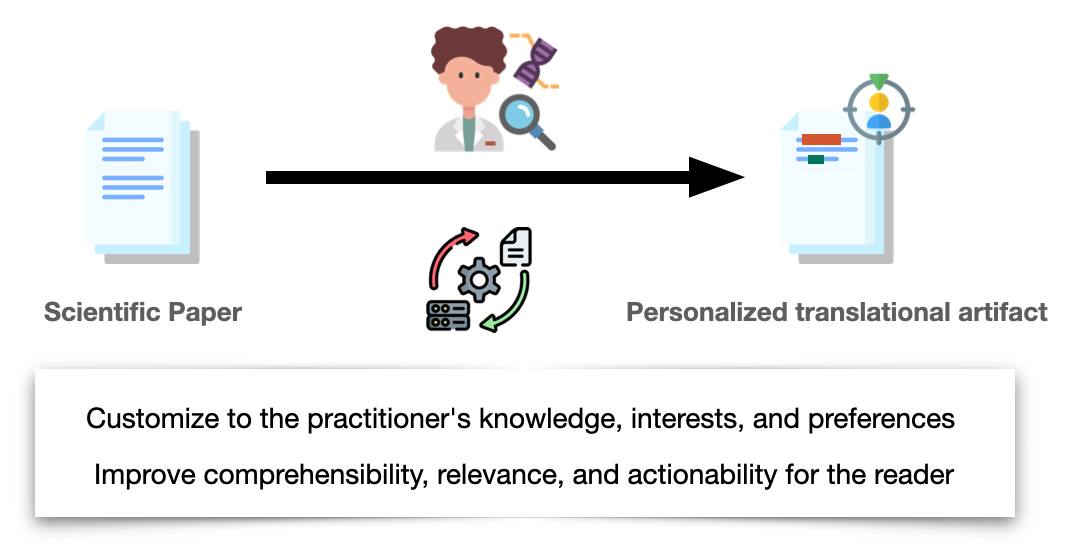projects
A collection of research projects and interactive demos (page currently under construction).
system demonstrations
projects
Projects in this section:
Improving STEM document accessibility
How do we make scientific documents more accessible for everyone? My work places particular emphasis on improving PDF accessibility for blind and low vision users and more recently, on document content accessibility for people with cognitive disabilities and/or IDD. This work spans multiple areas:
- Scientific PDF Accessibility: We developed SciA11y, a system for converting scientific PDFs into accessible HTML. This project is publicly available as the Paper to HTML web tool, where users can convert scientific PDFs into accessible HTML on demand.

-
Alt Text Generation and Analysis: We introduced FigurA11y, a tool that integrates an AI assistant to help authors write scientific alt text. We’ve also released datasets of alt texts from HCI publications and developed automated methods for analyzing alt text quality to understand current practices and gaps.
-
Accessibility Research Meta-Analysis: Through surveying and analyzing trends in the literature, we better understand accessibility research practices and citation patterns. This work includes bibliometric analyses of citation diversity in accessibility and HCI research, and a survey examining how research communities reference and build upon accessibility work. Our current investigation reveals the declining accessibility of scholarly PDFs over the last decade, and how publishing model and platform changes affect document accessibility.
Relevant Publications:
- Benchmarking PDF Accessibility Evaluation (To appear in ASSETS 2025)
- Uncovering the New Accessibility Crisis in Scholarly PDFs (ASSETS 2024)
- FigurA11y: AI Assistance for Writing Scientific Alt Text (IUI 2024) [code]
- Paper to HTML: A Publicly Available Web Tool for Converting Scientific PDFs into Accessible HTML (ACM SIGACCESS)
- A Dataset of Alt Texts from HCI Publications (ASSETS 2022) [code]
- SciA11y: Converting Scientific Papers to Accessible HTML (ASSETS 2021, Best Artifact Award)
- What Do We Mean by “Accessibility Research”? (CHI 2021, Best Paper Honorable Mention)
- A Bibliometric Analysis of Citation Diversity in Accessibility and HCI Research (CHI LBW 2021)
- Improving the Accessibility of Scientific Documents (arXiv)
Blog Posts: SciA11y part I and part II
Ongoing Work:
- Developing more robust AI-assisted accessibility tools
- Measuring and addressing the ongoing accessibility problem in scholarly publishing
- Creating guidelines and standards for accessible scientific communication
- Going beyond document accessibility to address issues of content accessibility
AI-assisted Literature Review
How can we use AI to help researchers discover, analyze, and synthesize scientific literature more effectively? My work focuses on developing tools and methods that assist researchers in navigating the ever-growing body of scientific literature, with particular emphasis on biomedical research and scientific claim verification. This work spans multiple areas:
-
Literature Discovery and Synthesis: Through projects like CHIME and MS², we’re developing tools to help researchers organize and synthesize scientific literature. CHIME provides LLM-assisted hierarchical organization of studies for literature reviews, while MS² focuses on multi-document summarization of medical studies. I have also contributed heavily to the development of the Semantic Scholar Open Research Corpus (S2ORC) and many other open scholarly datasets.
-
Scientific Claim Verification: We developed several systems for verifying scientific claims against literature. These frameworks help identify supporting or refuting evidence for scientific claims, detect contradictory statements, and assess claim consistency across papers. Our work includes methods for zero-shot claim verification and automated claim generation from scientific texts.
Relevant Publications:
- ROBoto2: An Interactive System and Dataset for LLM-assisted Clinical Trial Risk of Bias Assessment (To appear in EMNLP Demo 2025)
- CHIME: LLM-Assisted Hierarchical Organization of Scientific Studies for Literature Review Support (ACL Findings 2024)
- Zero-shot Scientific Claim Verification Using LLMs and Citation Text (SDP 2024)
- TOPICAL: TOPIC Pages AutomagicaLly (NAACL Demo 2024)
- Automated Metrics for Medical Multi-Document Summarization Disagree with Human Evaluations (ACL 2023)
- SciFact-Open: Towards Open-domain Scientific Claim Verification (EMNLP Findings 2022)
- Generating Scientific Claims for Zero-Shot Scientific Fact Checking (ACL 2022)
- MultiVerS: Improving Scientific Claim Verification with Weak Supervision (NAACL Findings 2022)
- MS²: Multi-Document Summarization of Medical Studies (EMNLP 2021)
- Fact or Fiction: Verifying Scientific Claims (EMNLP 2020)
Ongoing Work:
- Developing better evaluation metrics for scientific long-form generation
- Creating tools to help researchers organize and synthesize literature, or conduct other stages of literature review
- Investigating the role of AI in scholarly information access
Translational Science Communication
How do we make complex scientific knowledge understandable, trustworthy, and actionable for diverse audiences? My work in translational science communication focuses on developing methods and tools to bridge the gap between research and the needs of practitioners, patients, and the public, e.g., through:
-
Plain Language Summarization of Medical Research: Medical research papers can be transformed into plain language summaries that patients, caregivers, and the broader public can more easily understand. This direction focuses not only on simplifying complex texts, but also on evaluating the accuracy, simplicity, and factuality of outputs to ensure that critical health information is communicated.
-
Translating Research for Other Audiences: Scientific knowledge is also vital for professionals outside of medicine, including designers, educators, and policymakers. Research findings can be reframed into accessible, actionable, and more engaging artifacts, such as design cards or policy briefs, or made interactive in a way that supports evidence-informed decision-making in other domains.

Relevant Publications:
- What About My Design Context?: Exploring the Use of Generative AI to Support Customization of Translational Research Artifacts (DIS 2025)
- APPLS: Evaluating Evaluation Metrics for Plain Language Summarization (EMNLP 2024)
- From Paper to Card: Transforming Design Implications with Generative AI (CHI 2024)
- Paper Plain: Making Medical Research Papers Approachable to Healthcare Consumers with Natural Language Processing (TOCHI 2023)
Ongoing Work:
- Developing methods for plain language generation across scientific domains, with a focus on medicine
- Extending translational science communication to other domains (e.g., design, policymaking)
- Building interactive tools that embed research evidence directly in practitioner workflows


